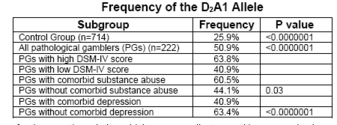To those on both sides of the perpetual “nature vs. nurture” debate and to those who deny the usefulness of such a rigid dichotomy, recent work by geneticist David Comings will be of particular interest. His recent study, “The Molecular Genetics of Pathological Gambling,” provides insight that will pique the interest of researchers and clinicians across a wide spectrum of disciplines. There is always a danger of reductionism when trying to distill and discuss etiological research (and genetics, in particular), but his major findings can be summarized as thus: 1) Pathological gambling is a spectrum disorder; that is, a disorder that shares genetic and symptomologic characteristics with other neurological and psychiatric maladies. 2) Pathological gambling is a multifactorial and polygenic disorder. 3) There appears to be a correlation between pathological gambling and the presence of a specific dopamine-related genetic configuration. 4) The preceding findings lend credence to the classification of pathological gambling as a reward deficiency syndrome, involving an impairment of a particular neural pathway. Comings’ research deals primarily with the D2A allele (configuration) of the D2 dopamine receptor gene. The neurotransmitter dopamine, which directly affects the brain’s processing of reward, has long been suspected of being linked to alcoholism and other addictive behaviors. Dopamine is not the only neurochemical suspected of impacting addiction. Serotonin, the target of Prozac and several other antidepressants, and monoamine oxidase (MAO), an enzyme which breaks down serotonin, are also likely co-conspirators in the development of addictive disorders. (see The WAGER, Vol. 1(24))
Initial research found the D2A1 allele to be present in 24.5% of a control group (n=314) and present in between 42% and 55% of individuals suffering from various impulse disorders as well as autism and posttraumatic stress disorder (PTSD). His subsequent research, on which is current paper is based, was performed over a 3-year period. Comings took blood samples from and administered questionnaires to a group of 222 American, Caucasian, non-Hispanic pathological gamblers and from a control group of 714 with a demographic profile similar to the experimental sample. Selected results are summarized in the table be It is tempting to use this data to propose a direct causal relationship between the presence of the D2A1 allele and pathological gambling. Such a simple relationship is unlikely. Comings cites several other dopamine receptor genes (D1, D3, and D4) that may play a role similar to the D2 gene, on which the D2A1allele is based. Additionally, the correlation between a particular genotype with a particular trait does not necessarily preclude a role for environmental factors. And while the intentional limitation of the sample to Caucasian non-Hispanics helps control for the genetic variation which may complicate causitive research when using a multiethnic population, this exclusion also limits the universality of the findings.
The significance of the Comings study for the field of pathological gambling falls short of satisfying our desire for a simple causal relationship. The genetic linking of gambling disorders with other addictive, compulsive, and impulsive behavior supports the notion of a spectrum disorder which transcends discrete diagnostic categories. Should the spectrum concept be supported, researchers and clinicians alike will be forced to reconsider the entire paradigm of diagnostic classification which pervades so much of the mental health field. Might this warrant a reorganization of DSM-IV with a new home for pathological gambling in a newly created Spectrum Disorders category?
Source: Comings, David E. *(1998). The molecular genetics of pathological gambling. CNS Spectrums 3(6), 20-37.
This public education project is funded, in part, by The Andrews Foundation and the National Center for Responsible Gaming.
This fax may be copied without permission. Please cite The WAGER as the source.
For more information contact the Massachusetts Council on Compulsive Gambling,
190 High Street, Suite 6, Boston, MA 02110, U.S.





